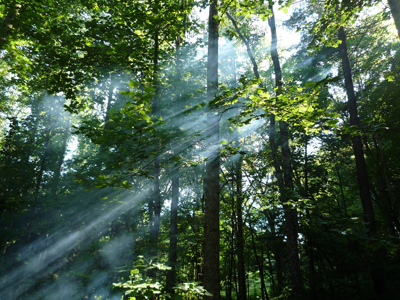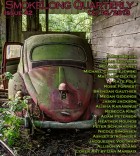It seems like it’s really easy for a lot of writers to act as if nothing in their stories could possibly ever be about them. With this story, you go the opposite route, your name is there, being screamed in caps throughout the story. How did you navigate the blend of Caren the author and Caren the character while writing this?
I believe that reading fiction often feels worthwhile because you can feel the writer risking herself, putting herself deeply in the path of risk, breaking and destroying herself, changing herself, to have written. Sometimes, being confessional feels like a shortcut, or a short hand, for risking oneself—it’s like this easy canister to throw, but I like this ease, this almost luxurious ease. Also, and with women writers in particular, people are going to assume it’s about you anyway, so you might as well put your name in ALL CAPS. A great example of this thought process can be found in Susan Steinberg’s recent collection of short stories, Spectacle, in which she most certainly plays with confession as form—and it is as much of a risk that perhaps she is not writing a mimesis of her life as it is that perhaps she is—the perhaps is a thing that trembles.
The writing in this piece oozes with lyricism and sense of the poetic. Are there particular poets that inspire you? And if so, who?
I have been consistently told that my writing is poetic and sometimes told to, then, write poetry. But what inspires me more, and most, is poetic prose—is a belief in poetic prose. And I hate it when the mainstream shames poetic prose, or tries to sanction it to poems, or to difficulty. Some poetic prose that guides me are Rilke’s letters (first, always first I will mention those), and I also love Maggie Nelson’s book Bluets. Clarice Lispector’s Hour of the Star is right here next to my computer. I am teaching a prose class this semester and using, incidentally, a poetry “textbook,” CAConrad’s A Beautiful Marsupial Afternoon, which includes his somatic poetry writing exercises. But the class is designed to be all about doing things badly, in bad, bad ways (which makes me think just now of Chelsey Minnis’s book of poetry Bad Bad), so we’re using it to write prose—and as much as I love the poems Conrad includes, which are resultant of these exercises, I love the exercises, which are like prose pieces, are beyond whatever your expectations are of how exercise instructions might be; they are like the diary of poetry, or something else—a story. A bad story. I have seen Conrad read from these pieces and have seen him totally refuse these as important prose pieces, and reassert his devotion to the poems, to the poem, and to the practical use of these as exercises, so I am using his book badly, and I love to.
This might be influenced because I read your interview in Big Lucks where you spoke about your fairy tale project, but there was a strong sense here of masturbation being this magic act as if fingers in just the right place could summon an endless summer. Can you tell us more about your fairy tale project or other ways that you’ve used fairy tale rules and aesthetic in your writing?
At the time of that Big Lucks interview, I was convinced I was going to become a writer of many, many fairytales. But it’s been abandoned. What I like about the fairy tale is the confident voice of world creation—so confidently can you, in this voice, assert anything, any abstraction. And I think writing is often good when it is confident, when it believes that it should be. Just like confession, I guess, the fairy tale form, too, can be like a shortcut (or a nice easy canister) towards something and in this case confidence. What I might like to take from this abandoned idea of writing fairy tales is this use of confident assertion, and particularly, a confident assertion of abstraction. This feels like an important use of being a writer, to just be part of a mass convincing (you and all the other writers and other artists) that things are abstract, amazingly abstract. Things are connected together so strangely, and so surely.
This feels like a question from the past, but I think it’s still applicable today. Female masturbation still feels very taboo. If you were talking to young writers struggling to write about sexuality, what advice would you give them?
To write about it! We’re still on lockdown, sexually. We’re still supposed to be homosexuals and heterosexuals and men and women and adults and children and whoever we are, according to television, coming in unison with our differentiated genitals connecting. But it’s all bogus. Life, and pleasure, and love, is way more various. And this variety is gorgeous. There’s a lot of cultural humor about male masturbation but women must masturbate so much more, because there’s a lot of cultural neglect and disregard for female, or more specifically, clitoral pleasure. I wonder how many women are masturbating right now. I wonder how many women are masturbating right now because they’ve recently had intercourse and their partner, who came in them, has finally left the room! I’ve been with people who have not cared one bit about my pleasure, and I think those people felt totally gratified and sanctioned by our culture to feel, or to not feel, this way, and I can only imagine how this attitude extends into issues of women’s health, employment, and the use of our time in general.
I just gave a reading in Missoula, MT, and this very cool undergraduate student came up to me after the reading and said, “I write about female masturbation, too!” and I loved to hear it. We talked a little bit about how it’s political, and I guess it’s also just really fun. What fun objects and feelings and gestures and colors! It’s pleasureful, and there’s power in taking that. Taking pleasure might be a process of saving yourself, saving your life.



 The SmokeLong Grand Micro Contest (The Mikey) is now an annual competition celebrating and compensating the best micro fiction and nonfiction online.
The SmokeLong Grand Micro Contest (The Mikey) is now an annual competition celebrating and compensating the best micro fiction and nonfiction online.